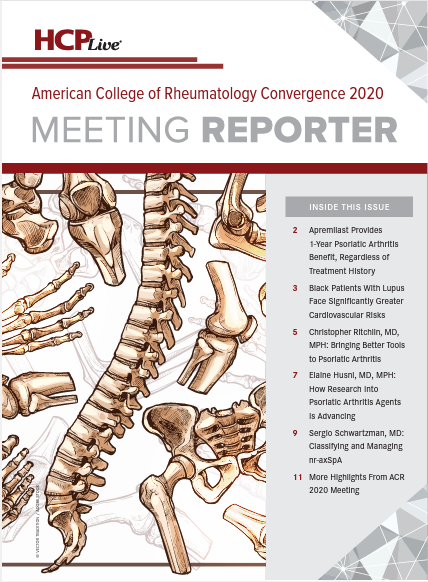Apremilast Provides One-Year Psoriatic Arthritis Benefit, Regardless of Treatment History
A real-world study shows the therapy was slightly more efficacious for biologic-naive PsA patients.
Jurgen Wollenhaupt, MD (Rheumatologie in Hamburg)

A real-world assessment of apremilast (Otezla) in patients with psoriatic arthritis (PsA) in Germany showed the oral therapy is associated with early and sustained benefit in patients regardless of their biologic treatment history.
In new data presented at the American College of Rheumatology (ACR) Convergence 2020 this week, a team of investigators reported that apremilast has shown marked benefit in a litany of PsA-centric outcomes in one-year interim findings from the Germany-based, multicenter, prospective, non-interventional LAPIS-PsA study.
The therapy, a selective PDE4 inhibitor, is currently approved in the US for the treatment of active PsA, moderate to severe plaque psoriasis in patients eligible for phototherapy or systemic therapy, and oral ulcers associated with Behçet's Disease in adults.
Led by Jurgen Wollenhaupt, MD, investigators presented the early LAPIS-PsA findings, in which apremilast is being assessed for the efficacy and safety of PsA in patients with and without a prior biologic therapy.
The team was observing apremilast-treated patients with PsA for outcomes in a series of clinical metrics:
- Physician’s Global Assessment of Disease Activity (PhGA)
- Patient’s Global Assessment of Disease Activity (PtGA)
- Leeds Enthesitis Index (LEI)
- Dactylitis counts
- Swollen and tender joint counts (SJC/TJC)
- Psoriatic Arthritis Impact of Disease (PsAID)
Clinical efficacy was observed at baseline, and at physician visits marked at approximately 1, 4, 7, and 10 months, then finally at 52 weeks. Safety was evaluated per adverse events (AEs) in the safety population, which included any patients to receive ≥1 dose of apremilast.
Their interim analysis included 418 enrolled patients, 306 of whom were biologic-naïve and 110 were biologic-experienced. Mean ages for the 2 patient groups were 54.6 and 55.3 years, respectively, while 56.4% and 65.1% were women, respectively.
Mean body mass index (BMI) scores were 29.5 and 29.6, respectively. The 2 groups shared similar baseline mean years of PsA duration, ethesitis counts, and dactylitis counts.
Wollenhaupt and colleagues observed early and sustained improvements in PhGA, PtGA, enthesitis, dactylitis, SJC, and TJC for both patient groups, while PtGA score achievement of 0-1 was more frequent among biologic-naïve patients at all study visits.
Mean PsAID scores were lower for biologic-naïve patients at all study points. A greater rate of patients in this group achieved minimal disease activity (MDA) over time.
Commonly reported AE rates (as per ≥5% of the patient group) were similar across both patient groups, with diarrhea, nausea, headache, and upper respiratory tract infection reported most frequently.
Overall, investigators concluded apremilast was associated with slightly greater achievements in initiated and sustained clinical improvement among patients with psoriatic arthritis whom have not taken prior biologics. But benefits and safety was observed across both groups nonetheless.
“In this real-world study of patients with PsA, APR demonstrated early and sustained effectiveness in patients with and without prior biologic therapy,” they wrote. “AEs were consistent with the known safety profile of APR.”
The study, “Effectiveness and Safety of Apremilast in Biologic-Naive versus Biologic-Experienced Patients with Psoriatic Arthritis in Real-World Clinical Practice Settings in Germany: Interim Analysis of an Ongoing, Multicenter, Prospective, Non-interventional Study,” was presented at ACR 2020.
